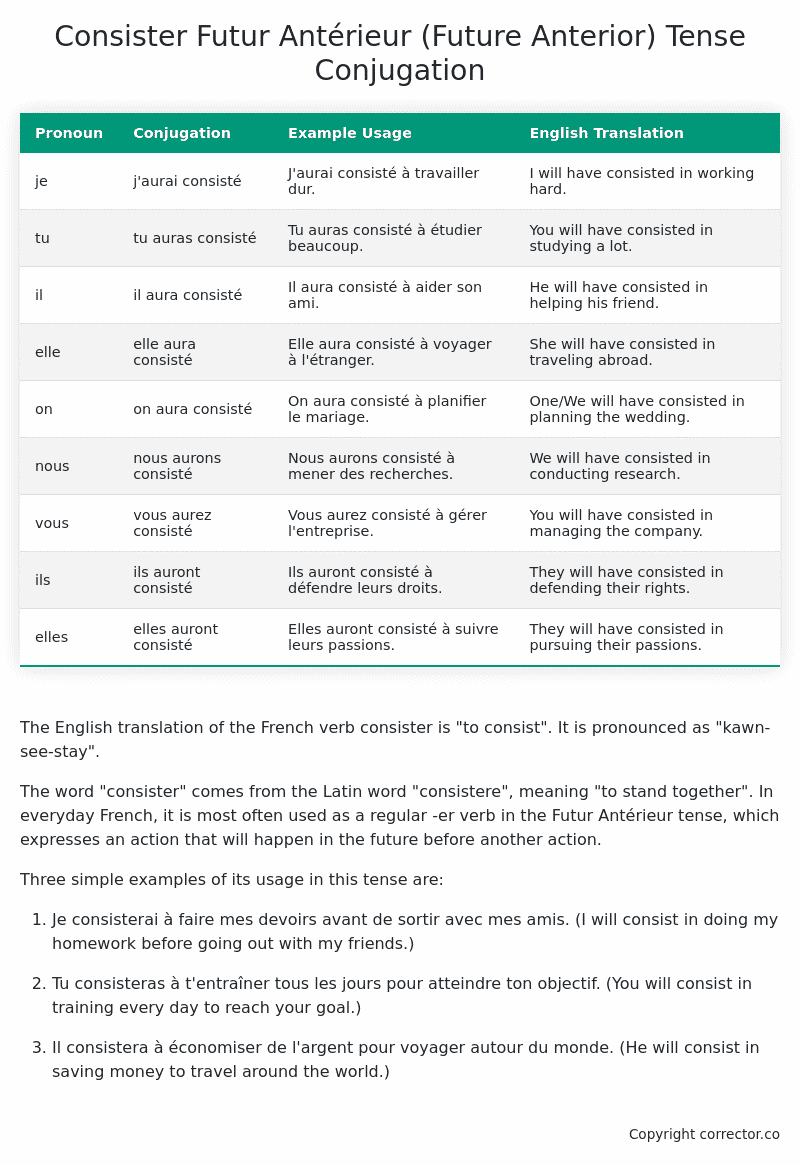Futur Antérieur (Future Anterior) Tense Conjugation of the French Verb consister
Introduction to the verb consister
The English translation of the French verb consister is “to consist”. It is pronounced as “kawn-see-stay”.
The word “consister” comes from the Latin word “consistere”, meaning “to stand together”. In everyday French, it is most often used as a regular -er verb in the Futur Antérieur tense, which expresses an action that will happen in the future before another action.
Three simple examples of its usage in this tense are:
-
Je consisterai à faire mes devoirs avant de sortir avec mes amis. (I will consist in doing my homework before going out with my friends.)
-
Tu consisteras à t’entraîner tous les jours pour atteindre ton objectif. (You will consist in training every day to reach your goal.)
-
Il consistera à économiser de l’argent pour voyager autour du monde. (He will consist in saving money to travel around the world.)
Table of the Futur Antérieur (Future Anterior) Tense Conjugation of consister
| Pronoun | Conjugation | Example Usage | English Translation |
|---|---|---|---|
| je | j’aurai consisté | J’aurai consisté à travailler dur. | I will have consisted in working hard. |
| tu | tu auras consisté | Tu auras consisté à étudier beaucoup. | You will have consisted in studying a lot. |
| il | il aura consisté | Il aura consisté à aider son ami. | He will have consisted in helping his friend. |
| elle | elle aura consisté | Elle aura consisté à voyager à l’étranger. | She will have consisted in traveling abroad. |
| on | on aura consisté | On aura consisté à planifier le mariage. | One/We will have consisted in planning the wedding. |
| nous | nous aurons consisté | Nous aurons consisté à mener des recherches. | We will have consisted in conducting research. |
| vous | vous aurez consisté | Vous aurez consisté à gérer l’entreprise. | You will have consisted in managing the company. |
| ils | ils auront consisté | Ils auront consisté à défendre leurs droits. | They will have consisted in defending their rights. |
| elles | elles auront consisté | Elles auront consisté à suivre leurs passions. | They will have consisted in pursuing their passions. |
Other Conjugations for Consister.
Le Present (Present Tense) Conjugation of the French Verb consister
Imparfait (Imperfect) Tense Conjugation of the French Verb consister
Passé Simple (Simple Past) Tense Conjugation of the French Verb consister
Passé Composé (Present Perfect) Tense Conjugation of the French Verb consister
Futur Simple (Simple Future) Tense Conjugation of the French Verb consister
Futur Proche (Near Future) Tense Conjugation of the French Verb consister
Plus-que-parfait (Pluperfect) Tense Conjugation of the French Verb consister
Passé Antérieur (Past Anterior) Tense Conjugation of the French Verb consister
Futur Antérieur (Future Anterior) Tense Conjugation of the French Verb consister (this article)
Subjonctif Présent (Subjunctive Present) Tense Conjugation of the French Verb consister
Subjonctif Passé (Subjunctive Past) Tense Conjugation of the French Verb consister
Subjonctif Imparfait (Subjunctive Imperfect) Tense Conjugation of the French Verb consister
Subjonctif Plus-que-parfait (Subjunctive Pluperfect) Tense Conjugation of the French Verb consister
Conditionnel Présent (Conditional Present) Tense Conjugation of the French Verb consister
Conditionnel Passé (Conditional Past) Tense Conjugation of the French Verb consister
L’impératif Présent (Imperative Present) Tense Conjugation of the French Verb consister
L’infinitif Présent (Infinitive Present) Tense Conjugation of the French Verb consister
Struggling with French verbs or the language in general? Why not use our free French Grammar Checker – no registration required!
Get a FREE Download Study Sheet of this Conjugation 🔥
Simply right click the image below, click “save image” and get your free reference for the consister Futur Antérieur tense conjugation!

Consister – About the French Futur Antérieur (Future Anterior) Tense
Construction
Common Everyday Usage Patterns
Interactions with Other Tenses
For example
Summary
I hope you enjoyed this article on the verb consister. Still in a learning mood? Check out another TOTALLY random French verb conjugation!


